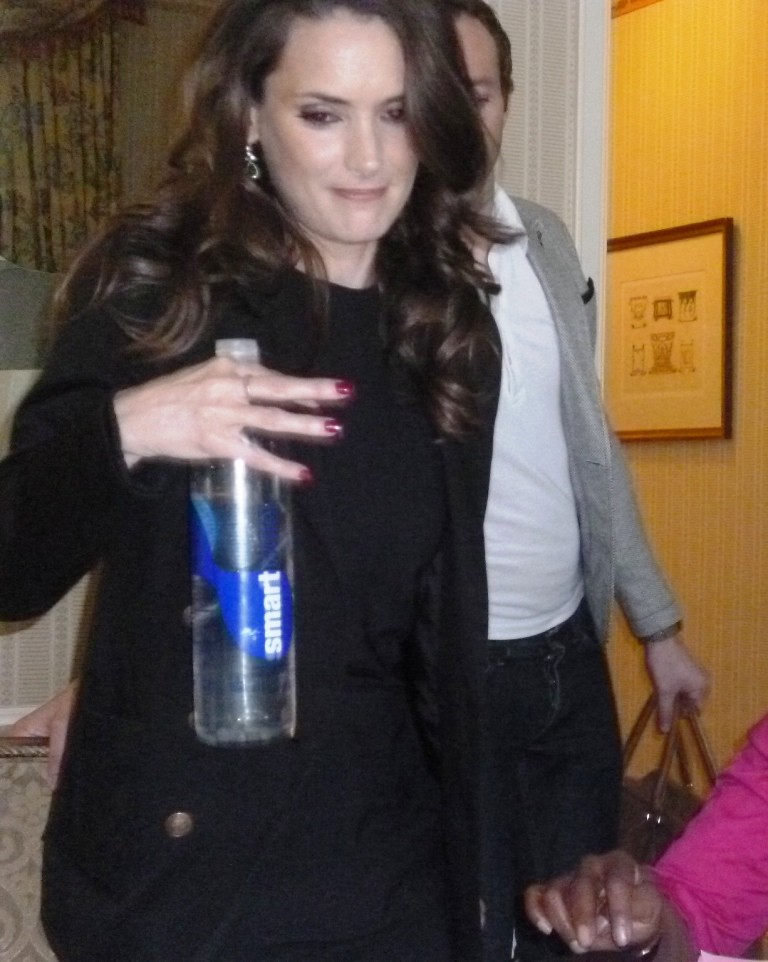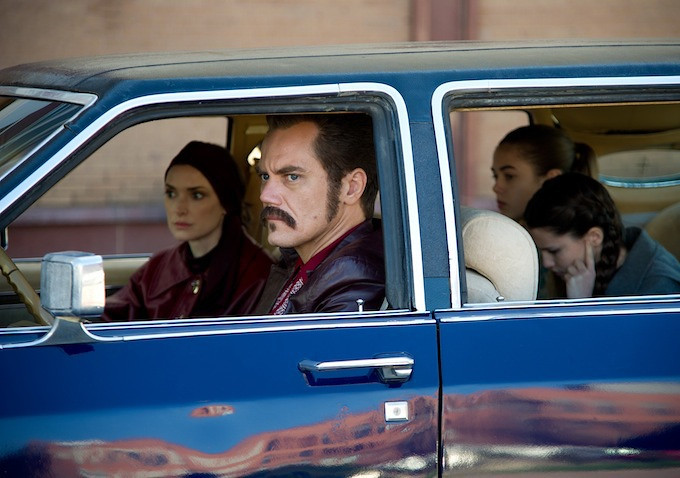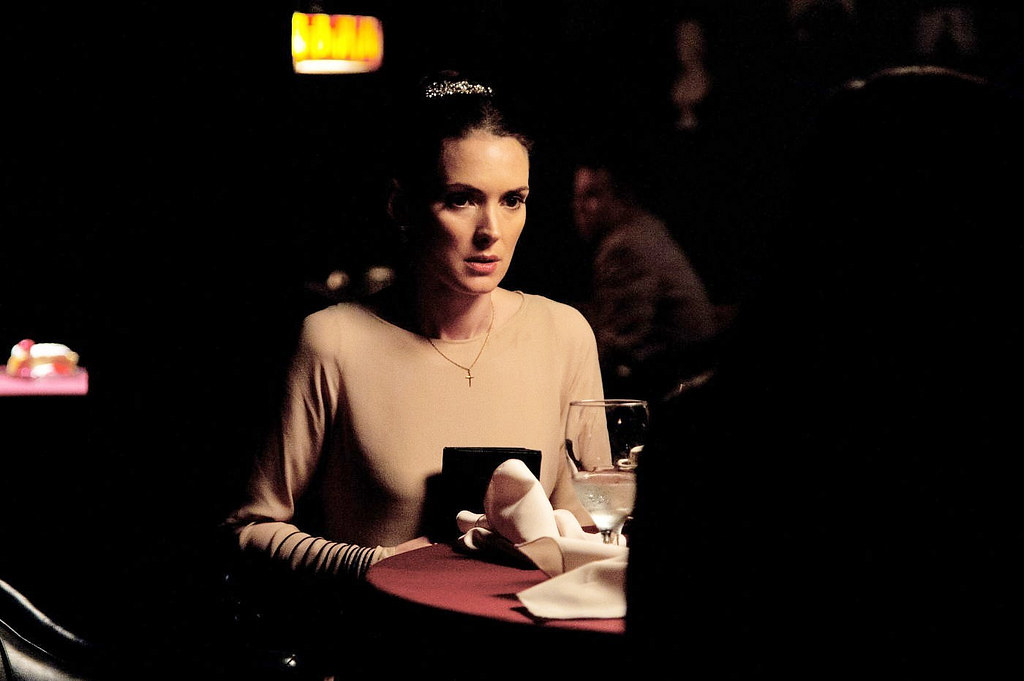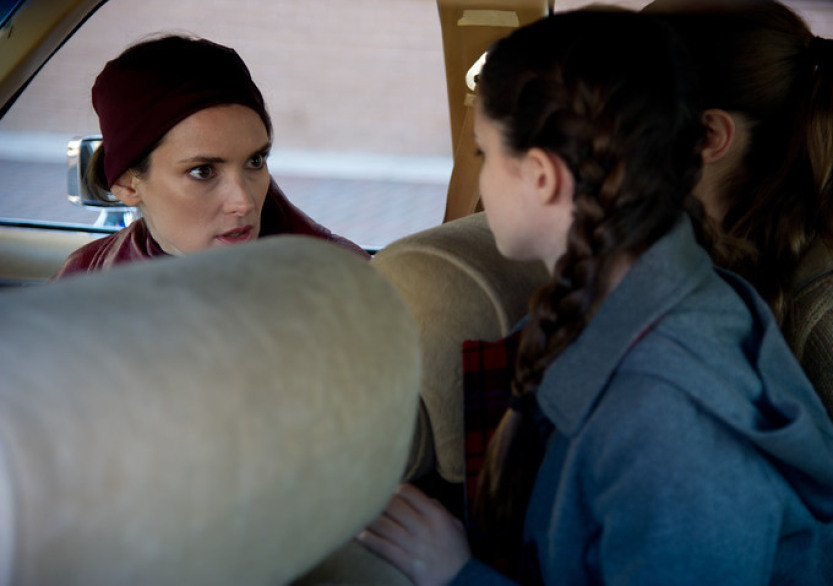Winona Ryder has stayed pretty low key in the recent past but you cannot keep a great actress down and in the new mob "hit" The Ice Man, Winona turns in a very real performance as Deborah Pelicotti Kuklinski, the widow of real-life northern New Jersey hit man Richard Kuklinski (played in the film by Michael Shannon) who bragged over 300 hits after being imprisoned even though the cops had the number somewhere more like a modest 100.
 |
| Winona Ryder at The Ice Man Press Day |
Deborah (whose real name was Barbara) was oblivious to her husband's means of income despite his unpredictable behavior and incredible influx of cash despite being a supposed film cutter for Disney. He was captured by authorities in 1986 in front of his Dumont, NJ home with, not surprisingly, his poor wife on "maximum freak out" and was the subject of a 2001 HBO documentary where he describes many of his murders in extreme detail with no emotion whatsoever on his face or in his voice.
Ryder plays Deborah as a concerned and loving wife with a childlike and concerned air; the fighting matches over Kuklinski's strange behavior including long absences and constant trips out of the house (to make phone calls that can't be tapped) don't happen until three quarters the way through the film. Ryder creates Deborah as less glitzy and over the top than the previous mob wives we have seen on both the small and big screen--although she seems happy to be able to live in a comfortable four bedroom home with her family and enjoys getting the occasion designer dress or bauble from her husband. Deborah has a big heart and co-star Michael Shannon told us that he admits that Winona "had a big job to do and threw herself 100 per cent into it...when you see her perform, you really see what her character is going through." To which Ryder says, "Michael's talents and skills are stunning."
 |
| Michael Shannon (Richard Kuklinski) and Winona Ryder (Deborah Kuklinski) |
Q: You didn’t want to know anything about Kuklinski outside of his home life and you deleted it all from your script so when you watched the movie, it was like seeing it for the first time. Can you talk about your approach to playing this (real) woman?
Winona Ryder: There wasn’t a lot available about her that I knew of at least. I met with (the director) Ariel about a year before when they were still trying to raise the money and that’s when I checked out some of the interviews that he did and I found them, but I found him repulsive and disturbing and I had to turn them off. I had a friend fast-forward any 40 second or more clip of him talking (that I could not handle). I know Michael and the others found it interesting though.
When Ariel he asked me to do it, I just knew that I’d have to sit through hours of Kuklinski talking about shooting people in the face or tying them up and having them eaten by rats, stuff that wouldn’t help my performance.
I just saw the script and I realize that it plays in a certain way where some people might think Deborah was oblivious (to her husband’s life as a hitman) but I really didn’t want to play it that way. I hoped that what I tried to do was play the denial which was what drew me to the whole project to begin with-- the deep, deep denial that she was living in for so long. I know we all deal with denial and have friends that deal with it--it’s a very human thing--but that level of it (is extreme). There was the fact that she was flourishing on blood money but I don’t know the extent of what she knew about what he was doing, but I do believe that it’s impossible that she didn’t know. This isn’t the 70’s with him having an office and secretary. It is suspicious that he has a beeper. There are just too many things.
I think that if she came out to acknowledge her husband’s life as a hitman would have meant: a) bearing some responsibility and b) Leaving with the kids and becoming a single mother but she liked her life. She liked the money and like living this way and it was twisted in a way. I do not see her as a victim at all. It’s hard; I’ve been getting mixed feedback. I really believe that violence is cyclical and he grew up terribly abused but people overcome it. I do believe there was greed. I do believe that she was weak--you hear people talking about strong roles for females in Hollywood but I think there is something to be said about weak people too. I’m not (really) saying she’s a weak person but she liked her life. I like the scene when she talks to her daughters about using the name God as an exclamation is just terrible and she is being all righteous. Then there’s a scene where I’m dancing with Michael and I’m like, “Oh I feel 30,000 dollars in your pocket, that’s great?” Who in their right mind wouldn’t be like, “Where the hell did you get 30,000 dollars? What’s going on?” There is a confrontation scene later here she says, “I asked him and blah blah blah.” The denial aspect of my character is something I was very interested in exploring.
You hear actresses talk a lot about finding strong female roles but there is something to be said about finding weak female roles because there is a weakness and strength to her cowardice. It would have been hard for her to acknowledge it and leave but that would have been the right thing to do.
For me, I only had a couple of times to show that she was more complex and had a lot of opportunities but I tried because I do think there was a lot going on with that woman and a weird, twisted relationship between them. It was a weird combination; I choose not to. There wasn’t a lot available to research but I did what she did and I went into denial. I blacked out everything that I wasn’t in that I was supposed to “know” but I blocked that stuff out like she did and tried to make a movie about this relationship.
Q: You never got to meet the actual woman (real name Barbara Kuklinski)?
WR: No, she’s changed her name and is not findable.
 |
| Winona Ryder as Deborah Kuklinski, wife of NJ hitman Richard Kuklinski |
WR: Did Ariel tell you that? I don’t know anything about that. I heard something about someone friending someone on that Facebook thing (laughs) but I don’t know. I don’t think that she would come but I don’t know. Certainly, this is the first time that I’ve played someone without having their blessing and a chance to talk to them but I do feel like in this case she has never admitted (to knowing anything) and has always stuck to the story that she knew nothing--so I don’t know why she would suddenly want to talk to me about it. This was also an adaptation and that was a first for me also. There’s a lot of stuff that wasn’t in the movie, and that’s why I’m not a director because I’m always questioning everything about the real life story. I would always be asking, “Why wasn’t this in the movie?”
Q: Was this your first time working with Michael Shannon and what was it like working with him?
WR: Well I’d been a fan of his since Bug and Jesus’ Son--he really stood out in that for me. Within the acting community, we’ve all been sort of rooting for him so it’s nice to see him getting his well-deserved attention in roles. Working with him was really interesting and great and different because he doesn’t really rehearse or block so there’s this element where you really truly don’t know what’s going to happen. In the beginning, that freaked me out just because I hadn’t worked that way in a while but it really pulls you into the moment and you have to be present. You have no choice but to be present and that’s ultimately what we’re supposed to be doing all the time as actors but we do get lazy and there is an element of no choice- you’re just being grabbed by the throat and it’s really, it’s happening, and it’s a total surprise so that part of it was really, but I have to say in saying all of that because I know that sounds scary but there’s a really odd combination of scared and safe with him.
Q: As the actor or character or both?
WR: As an actress, I felt like he had something where he wouldn’t let anything happen to me. He would maybe let things happen to himself and did. This one scene in particular, I remember. It was written when I confront him that he’s supposed to walk out and he went into the kitchen and started breaking things. That was not scripted. I was literally just reacting to him and all of that was just reacting. I saw blood, because he cut himself, and I started crying but he was, but I knew that that wouldn’t happen to me. I felt very safe but also on my toes. It was thrilling.
Q: Was that a challenging scene for you when he blows up?
WR: Yeah it was. Like I said, it was written a certain way, he’s supposed to get up and leave the room, so him going into the kitchen was a complete surprise.
 |
| Winona Ryder in The Ice Man |
Q: Do you think the director might have whispered in his ear?
WR: Nah.
Q: Well maybe you felt so safe because he took care of you and guarded you like a lion.
WR: Yeah. We didn’t have a lot of money and that props were period so we didn’t have a lot of duplicates of things and things were broken. The coffee table came over my head at one point and that was scary; I think that’s what caused blood. I was startled.
Q: You’ve played against some great villains in your career, have you ever thought of playing one yourself? Like Dracula?
WR: He was a wonderful villain. Yeah, I wish I could talk about this thing that I’m about to do but I’m not allowed to talk about it yet. I shouldn’t have even said that. Anyways, you’ll find out. What happens is I’ll say something off the cuff and I’ll see it as a headline. I said something really off the cuff when someone asked me if something (the media) had taken its toll and I was like ‘Aw, yeah’ and then the headline was like: “Something takes its toll on Winona.” Someone asked me about what kind of role I want next and I literally said -- “I don’t know, when you read it (in the press), you’ll know. It’s like a Phillip Roth book.” And the headline was, “Winona wants to be in (movie based on) a Philip Roth book.” So I don’t know how much I should say to you right now.
Q: You’ve been doing this since you were a teenager. How do you handle the ups and downs of the business? You were 16 when you started.
WR: I was 12! Honestly what helps for me--and this was even in the beginning too—was that I never moved to LA. When I started, I had to stay in school and could only work during the summers and had to maintain a 4.0. But when I graduated I held a home in San Francisco and I still do. I think that the fact that I was never living in LA really helped me (stay together).
You know at the end of the day all that mattered was if you were in a good movie. You didn’t even think about box office. Or maybe that was just me. I think also what helps me not get too caught up in everything is just not engaging so much in the internet. I know there are many pluses to it and I’m not trying to (ignore what people are saying about me). I know that’s not even a conversation. I just think googling yourself is a bad idea. I did it once and someone had to talk me off a ledge. (Laughs.)
I know this is really old school, but if you just think about the work itself and you don’t think about the end result as much. The reward is in the work and in the moment and that’s a good way to live your life, too. Like John Lennon said, “Life is what happens when you’re busy making your plans.” Just the work itself is the reward; it’s not to get somewhere. When you start thinking that way, your work doesn’t seem as present.
Q: Do you look back and wonder why you became an actress so young?
WR: To me, it’s weird because for my whole life it’s the one job that I’ve had--and I’ve had it since I was 12 and I’m 41 now! I’ve definitely had times when I didn’t work as much and times when I worked too much. I’m human. Watching the girls (in the film playing my character’s daughters) and remembering that age made me want to protect them, even though I was on very kid-friendly sets on that age.
Q: What do you hope that an audience takes from this movie?
WR: I don’t know. I don’t see this as a message movie at all. I don’t know. It’s tough man because I’m not normally (this torn). I know that they have to make Kuklinski the protagonist in order to tell the story and Michael Shannon brings something amazing to the role. He brings some sort of empathy or humanity to the role (of a cold-blooded killer) but for me, these people were icky. This is set in America in the 70’s and there’s a lot of greed--and for me it was important not to romanticize that. This was a really twisted romance going on. I hope people will take away something from the performances. Michael Shannon and Chris Evans are amazing in it. The viewer has to take it like a version of what maybe happened in real life. It’s not a documentary obviously; things are changed but it’s definitely an onscreen look at duality and denial.
Photos: Anne Raso and Millennieum Entertainment
No comments:
Post a Comment